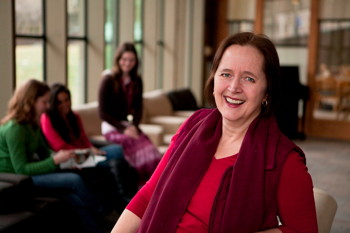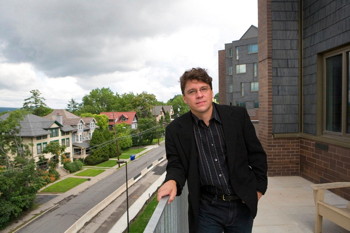CAMPUS LIFE
A West Campus exit interview
West Campus soon will mark a significant changing of the guard. This spring, the last two of the original five house professor-deans will wind down their final semesters as their houses' intellectual leaders. Ezra magazine recently sat down to talk with William Keeton House's Jefferson Cowie, associate professor of labor history, and Flora Rose House's Shirley Samuels, professor of English and American studies.

Shirley Samuels, professor of English and American studies, and house professor-dean of Flora Rose House. See larger image
What's the most important room in the house?
Shirley Samuels: The dining room, as far as I'm concerned, is the fireplace of the house. It's where you want students to come and warm themselves up and feel at home. This is a place where they gather.
What have you learned about how to inspire students?
Jefferson Cowie: With almost all my "Conversations at Keeton" (biweekly salons in my apartment) I have a pop tie-in. It has to be something kind of edgy. I realized this when we had a guest from Tulane University who studies the idea of "cool." The room was packed. The students learned about jazz, film noir, race relations, post-war history, gender. That's when the light bulb went off for me. Ever since then, the conversations have always been on some kind of broader idea that can draw in everyone, from engineering majors to philosophy majors.
Who else has been an exciting guest?
Cowie: Last year we did a theme: Cornell's most interesting and influential. I thought, which professors are you going to want to have experienced by the time you leave Cornell? So we basically brought in anyone who won a Nobel Prize, a MacArthur "genius" award, a Pulitzer. We've had Roald Hoffmann (theoretical chemistry), Walter LaFeber (history), Jon Kleinberg (computer science). It was great to have LaFeber sit up there and talk for an hour without notes and give an airtight presentation to 70 students.

Jefferson Cowie, associate professor of labor history, and house professor-dean of William Keeton House. See larger image
What intellectual or cultural programming have you emphasized?
Samuels: Issues of sexuality, feminism and domestic partnerships. I recruited house fellow Laura Weiss, director of Cornell's Women's Resource Center, who hosts the Feminism: Food for Thought weekly dinner discussion here, and house fellow Matt Carcella, director of the LGBT Resource Center. I encourage activity to make this a safe space for alternative ideas about lifestyle choices and feminism. … It means a sense of compassion and openness that can include a great deal of diversity.
I care about feminism. But I also care about student happiness and well-being. To have students come to class from a place where they feel at home is to have students who are able to engage and draw on the best of their thinking and creative possibilities.
How do you keep students thinking?
Cowie: Once a semester I invite someone who has written something critical of this generation, like author Mark Bauerlein, who wrote "The Dumbest Generation," arguing that the Internet has diminished students' critical thinking skills. … It's a chance for the students to think about who they are in history, what makes their generation different or the same from other generations, and what their burdens and missions may or may not be.
How have you helped students feel they belong?
Samuels: This year we instituted something that was in place at some of the other houses: an active citizen program, where the students who express the most commitment to working with the programs of the house have dibs on returning. … That makes a difference for the long-term health of the house, in terms of people's sense of community.
How do students benefit from living on West Campus?
Cowie: The debates are happening in a way that you cannot get anywhere else. Everywhere else on campus, it's 'here is the information' through a lecture. Or if it's a seminar, it's going to be graded, so it's full of anxiety [for the students]. If a house fellow is at a meal and sitting down with students, there's a little anxiety, but they come to the table more as equals than they will anywhere else on campus. They're coming together to have a discussion. … This is a place for them to do that. For days afterward you hear the students talking about ideas that were planted.
Visit www.westcampushousesystem.cornell.edu